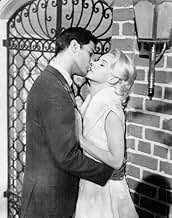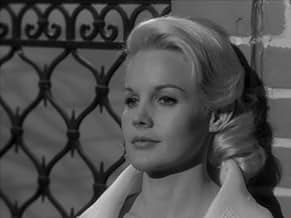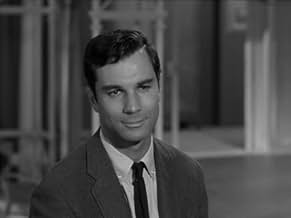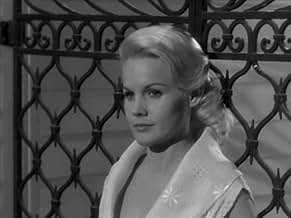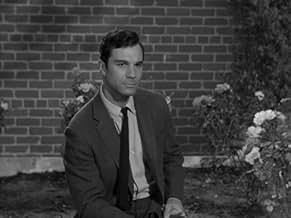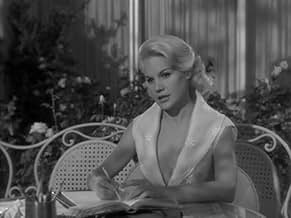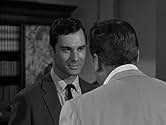Agrega una trama en tu idiomaA millionaire with a mysterious fiancee hires a detective to discover the truth about her past.A millionaire with a mysterious fiancee hires a detective to discover the truth about her past.A millionaire with a mysterious fiancee hires a detective to discover the truth about her past.
Ricky Allen
- Boy in Library
- (sin créditos)
Val Avery
- Pudgey Smith
- (sin créditos)
- Dirección
- Guionistas
- Todo el elenco y el equipo
- Producción, taquilla y más en IMDbPro
Opiniones destacadas
Excellent Carroll Baker flick. Made just before Harlow almost ruined her career. Carroll plays a rich novelist who's engaged to sleaze-bag Peter Lawford. Lawford knows squat about her past so he hires second rate P.I. George Maharis to find out about her life. What he uncovers is on the tawdry side. Carroll endured many a degredation before turning to prostitution. Some scenes are a little campy. I love the scene where she gets a job in a hooker pick up joint run by a drag queen who's idea of warbling a song is climaxed by him/her karate chopping some blocks of wood on stage. Good supporting cast including Joanne Dru and the ever talented Ann Southern playing a frumpy has-been hooker. Lloyd Bocher plays a client who has some rather kinky-S&M ideas about foreplay, quite shocking for 1964, tame by today's standards. I really liked this movie as the viewer starts to feel much empathy for Carroll's character after surviving all the crap she went through in her life. Not your typical Hollywood ending either.
Sylvia (1965)
A movie far out of its time, yet ahead of its genre. By 1965 this kind of small black and white film had migrated to television productions, or had disappeared. While clearly low budget without any stars, it keeps a tight formal structure and strong production throughout. And the idea, gradually piecing together someone's identity, makes for a great movie.
Even if it does borrow, in terms of structure only, from "Citizen Kane," no less. That is, an investigator is set off to learn who the real Sylvia is, and by meeting with one important contact after another, and going through a series of well done flashbacks, we are able to piece together the complicated life of the title character. The biggest difference from Kane (besides virtuosic style) is that Sylvia is an ordinary person. Or she seems ordinary until you learn in stages the nuances and integrity of her survival.
There are many things left unanswered, and I'm not sure that's totally for the best. We never quite understand her meandering through dramatic (and noble) moments one after another. What kind of childhood set her off this way ("Kane," significantly, pivoted around a childhood event). Sylvia is a construction, apparently beautiful (in movie terms), but more importantly interesting, strong, independent. A great role model.
The investigator, called Mack, is played by George Maharis, who has a steady and calm approach all through. What happens after the establishment of his role is really terrific, because each person he encounters offers a new scenario, a new setting and story and conversation, and then a new flashback. And some of these side characters are fabulous true characters. So you get captivated time and after time. In some ways the least interesting character is this hopeless perfect and yet tainted paradigm, Sylvia, who by the end gets her own long segment, a present tense adjustment of all of what we've seen so far.
It's a little stilted at times, and the patient pace isn't always a benefit. The ending might actually seem a bit inevitable, too, which is fair enough. But in the big view you almost want to see it again to catch some of the piece you might have missed. It's filmed a decade after the last great noirs, and so isn't a big in the mode (though some people throw every b&w movie into the mix if they have a loner guy and a blonde). And it is a terrific tonic to the bigger Hollywood machine made stuff coming out in widescreen color (a lot of it). But when you see the changes in the medium with "Who's Afraid of Virginia Woolf" and so on the next year or two, it's really really old fashioned.
Check it out.
A movie far out of its time, yet ahead of its genre. By 1965 this kind of small black and white film had migrated to television productions, or had disappeared. While clearly low budget without any stars, it keeps a tight formal structure and strong production throughout. And the idea, gradually piecing together someone's identity, makes for a great movie.
Even if it does borrow, in terms of structure only, from "Citizen Kane," no less. That is, an investigator is set off to learn who the real Sylvia is, and by meeting with one important contact after another, and going through a series of well done flashbacks, we are able to piece together the complicated life of the title character. The biggest difference from Kane (besides virtuosic style) is that Sylvia is an ordinary person. Or she seems ordinary until you learn in stages the nuances and integrity of her survival.
There are many things left unanswered, and I'm not sure that's totally for the best. We never quite understand her meandering through dramatic (and noble) moments one after another. What kind of childhood set her off this way ("Kane," significantly, pivoted around a childhood event). Sylvia is a construction, apparently beautiful (in movie terms), but more importantly interesting, strong, independent. A great role model.
The investigator, called Mack, is played by George Maharis, who has a steady and calm approach all through. What happens after the establishment of his role is really terrific, because each person he encounters offers a new scenario, a new setting and story and conversation, and then a new flashback. And some of these side characters are fabulous true characters. So you get captivated time and after time. In some ways the least interesting character is this hopeless perfect and yet tainted paradigm, Sylvia, who by the end gets her own long segment, a present tense adjustment of all of what we've seen so far.
It's a little stilted at times, and the patient pace isn't always a benefit. The ending might actually seem a bit inevitable, too, which is fair enough. But in the big view you almost want to see it again to catch some of the piece you might have missed. It's filmed a decade after the last great noirs, and so isn't a big in the mode (though some people throw every b&w movie into the mix if they have a loner guy and a blonde). And it is a terrific tonic to the bigger Hollywood machine made stuff coming out in widescreen color (a lot of it). But when you see the changes in the medium with "Who's Afraid of Virginia Woolf" and so on the next year or two, it's really really old fashioned.
Check it out.
Sylvia certainly has a great tradition of similar films to fall back on. Chicago Deadline, The Mask Of Dimitrios, and the great Citizen Kane all deal with someone trying to pick up the real story of somebody by interviewing people from the past and getting flashback incidents.
Peter Lawford has hired PI George Maharis to trace down the background of Sylvia, the girl he plans to marry. What Carroll Baker in the title role has given him is completely bogus though she's pretty well fixed on her own and doesn't need Lawford's millions. But he's a careful sort and Maharis begins his work.
I have to say that it was a clever idea for him to use her writings, she's a poet, for traces of local idiomatic expressions. Maharis has a linguistics professor on call who tells him his starting point should be Pittsburgh.
After that Maharis starts on his hunt and meets a variety of characters played by some really fine character actors. It's the best thing Sylvia has going for it. These people really make the film. The most memorable for me are Ann Sothern who works in a penny arcade and is a drunk and Viveca Lindfors as a librarian from Pittsburgh who gives Maharis his first bit of real information.
Baker does well as a woman who really graduated summa cum laude from the school of hard knocks. The film was supposed to be a breakout film for George Maharis who left his TV series Route 66 for a career on the big screen. It never quite worked out that way. He does all right in the part of the PI, but I think either Paul Newman or Robert Mitchum would have aced the part of the private eye.
Still Sylvia is worth watching for one of the best cast of character players ever assemble this side of John Ford or Frank Capra.
Peter Lawford has hired PI George Maharis to trace down the background of Sylvia, the girl he plans to marry. What Carroll Baker in the title role has given him is completely bogus though she's pretty well fixed on her own and doesn't need Lawford's millions. But he's a careful sort and Maharis begins his work.
I have to say that it was a clever idea for him to use her writings, she's a poet, for traces of local idiomatic expressions. Maharis has a linguistics professor on call who tells him his starting point should be Pittsburgh.
After that Maharis starts on his hunt and meets a variety of characters played by some really fine character actors. It's the best thing Sylvia has going for it. These people really make the film. The most memorable for me are Ann Sothern who works in a penny arcade and is a drunk and Viveca Lindfors as a librarian from Pittsburgh who gives Maharis his first bit of real information.
Baker does well as a woman who really graduated summa cum laude from the school of hard knocks. The film was supposed to be a breakout film for George Maharis who left his TV series Route 66 for a career on the big screen. It never quite worked out that way. He does all right in the part of the PI, but I think either Paul Newman or Robert Mitchum would have aced the part of the private eye.
Still Sylvia is worth watching for one of the best cast of character players ever assemble this side of John Ford or Frank Capra.
Sylvia is a well developed film, from cast to direction. It was far ahead of its' time. The plot is slow in the beginning but quickly moves to a steady pace. Sylvia confronts difficult issues few movies can handle with any lasting credibility. The characters are rich and diverse in their perspectives. Carroll Baker delivers a superb performance as the female lead. Carroll Baker's supporting actors and actresses enrich the weave of the emotional undercurrents of the film. Sylvia is also complemented with the use of vivid symbolism and well formed dialogue.
The filmic trope of presenting a mystery woman to the viewer through the recollections of her friends and lovers has a long history. Perhaps "Laura" is the most famous. A much lesser-known one is the British "Woman in Question." "Sylvia" is in that tradition: a wealthy man wants to find out about the background of his fiancée, Sylvia, so hires a private detective to investigate. As the P.I. encounters people from Sylvia's past, the stories that they tell him are the flashback elements of the film. There's a very touching episode with Viveca Lindfors, as well as one with Ann Sothern. While the film is somewhat desultory in its pacing, it's got some great folks-Edmund O'Brien, Joanne Dru, etc.--and a suitably disengaged performance from Carroll Baker in the title role. It actually works well for the character, who throughout a series of tawdry experiences has kept a part of herself removed and untouched. We also get to see a well-toned George Maharis with his pajama top off--another reason to catch the film if it ever shows up.
David Raksin, who composed the score for "Laura," some twenty years earlier, provides a nice score for "Sylvia" (note the use of the waltz from William Wyler's "Carrie"--also a Paramount film-- in the scene at the restaurant with Sothern and Maharis).
David Raksin, who composed the score for "Laura," some twenty years earlier, provides a nice score for "Sylvia" (note the use of the waltz from William Wyler's "Carrie"--also a Paramount film-- in the scene at the restaurant with Sothern and Maharis).
¿Sabías que…?
- TriviaTo prepare herself to play the heroine with a checkered past, Carroll Baker actually worked a shift in an all-night diner (where she went unnoticed), made change in a penny arcade booth, visited a Tijuana brothel and so forth - publicity stunt "research" that was documented in a lengthy February 27 1965 Saturday Evening Post picture story called "The Lady Was A Tramp".
- ErroresIn the library sequence, none of books are marked with the Dewey Decimal System coding or other markings that would enable anyone to easily find or shelve books.
- Citas
Alan Macklin: You mentioned something about a job.
Frederic Summers: Sylvia West. I want to know who she is. I want to know everything there is to know about Sylvia West. Everything a prospective husband has a right to know.
- ConexionesReferenced in What's My Line?: Lee Remick (2) (1965)
- Bandas sonorasSylvia
Lyrics by Paul Francis Webster
Music by David Raksin
Sung by Paul Anka
Thru the courtesy of RCA Victor Records
Selecciones populares
Inicia sesión para calificar y agrega a la lista de videos para obtener recomendaciones personalizadas
- How long is Sylvia?Con tecnología de Alexa
Detalles
- Fecha de lanzamiento
- País de origen
- Idiomas
- También se conoce como
- Das Vorleben der Sylvia West
- Locaciones de filmación
- Beverly Amusement Park, 8500 Beverly Blvd., Los Ángeles, California, Estados Unidos(lunch scene after the bookshop)
- Productora
- Ver más créditos de la compañía en IMDbPro
- Tiempo de ejecución
- 1h 55min(115 min)
- Color
Contribuir a esta página
Sugiere una edición o agrega el contenido que falta

